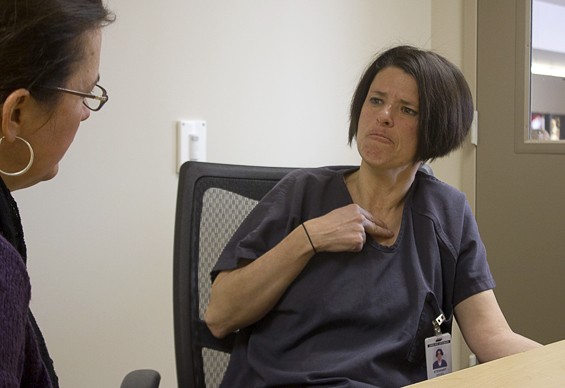Angel Charlene Stewart stands at the guard station in the visiting room of the Iowa Correctional Institution for Women, twisting a lanyard around her fingers. She's anxious. She just found out she's got unexpected visitors in the lobby. "Lawyers from Missouri" is all the male guard tells her.
When the heavy electronic doors from the waiting room slide open, she sees three people -- the members of the Women Initiate Legal Lifelines to Other Women, or WILLOW Project, who've just made the five-hour drive from St. Louis to the prison in Mitchellville, Iowa. Even though Anne Geraghty-Rathert, the attorney who founded the project, has been representing Stewart for four years, Stewart hadn't automatically assumed it would be her.
"He didn't say, 'Your lawyers,' he said, 'Lawyers are here from Missouri,'" Stewart says, once they're all seated around a table in a private room. "I said, 'I'm passing out right now.'"
Stewart is terrified of Missouri.
She had lived her whole life in Des Moines, and only set foot across Iowa's southern border twice: once when she was driven to a remote Missouri farm at the end of a horrifying crime spree, and once more to visit a courthouse in Clark County in the far northeast tip of the state where she pleaded guilty to first-degree kidnapping. She took the deal when she was 21 years old, after the Clark County prosecutor threatened to pursue the death penalty. As Stewart sees it, Missouri is the state that tried to kill her.
A thin 41-year-old with a handsome face and dark, chin-length hair, Stewart is charming if a bit shy. But it's also immediately clear that there's something a little off, something childlike about her.
"This clemency thing has just got me scared," she tells Geraghty-Rathert. "Really, I don't know what a clemency is. And everybody says it's like a pardon. Well, OK, I don't even know what a pardon is."
"Maybe that'll make you less nervous, if you know what we're talking about," says Geraghty-Rathert.
"I said, 'These lawyers think they're going to handcuff me and throw me in the back of a truck,'" says Stewart.
"No, no --"
"I'm fallin' out."
"You know we would never do that."
Stewart listens attentively as Geraghty-Rathert explains her predicament once more. She is serving two concurrent life sentences for first-degree kidnapping: one without the possibility of parole in Iowa and one with parole in Missouri. Despite the fact that she told the police who arrested her in 1994 that she was beaten, and her life -- and that of her one-and-a-half-year-old child -- threatened if she did not participate in the crimes, she was charged the same as her much older, male co-defendants who orchestrated the kidnapping and murder of two elderly women. Neither the threats nor the violence against Stewart were used as a defense strategy by her attorneys. Now, she's trying to convince the governors of two states to grant her clemency, which is an executive power to pardon, lessen or change an inmate's prison sentence.
But Stewart recently gained some powerful new allies. Last October she became one of fourteen women whose cases are now part of the Community Coalition for Clemency, a group of politicians, lawyers, judges and activists putting pressure on Missouri Governor Jay Nixon to reconsider the prison sentences of women who committed their crimes while the victims of physical and/or sexual violence. Geraghty-Rathert applied on Stewart's behalf to Nixon, who throughout six years in office has rarely exercised this power, even as the list of over 2,200 inmate applicants continues to grow.
Still, Stewart is wracked with guilt. Her mind slips fluidly between the present and memories of the day that Phyllis King and Clara Baker died at the hands of Stewart's "boyfriend," a 68-year-old career criminal who terrified her.
"I was so scared. All those things I did was horrible. Horrible," she says. "It wasn't even me."
"It wasn't you, Angel. It wasn't," says Eileen McManmon, a WILLOW paralegal. "You were forced to do these things. It's so not fair that you are here. We see that. We see that you're a good person."
"I'm just scared. I got this clemency, and I don't even know --"
"That hasn't happened, it's just something we're talking about now," says McManmon.
"I think about the other ladies," Stewart continues, referring to the other women represented by the Community Coalition for Clemency. "Some of those women need a second chance. I mean, yeah, I may need a second chance, but if I could and I got a clemency, I would probably pass it off to one of those ladies you told me about...I mean, those ladies don't deserve to do the rest of their life in prison."
"Neither do you," says McManmon.







